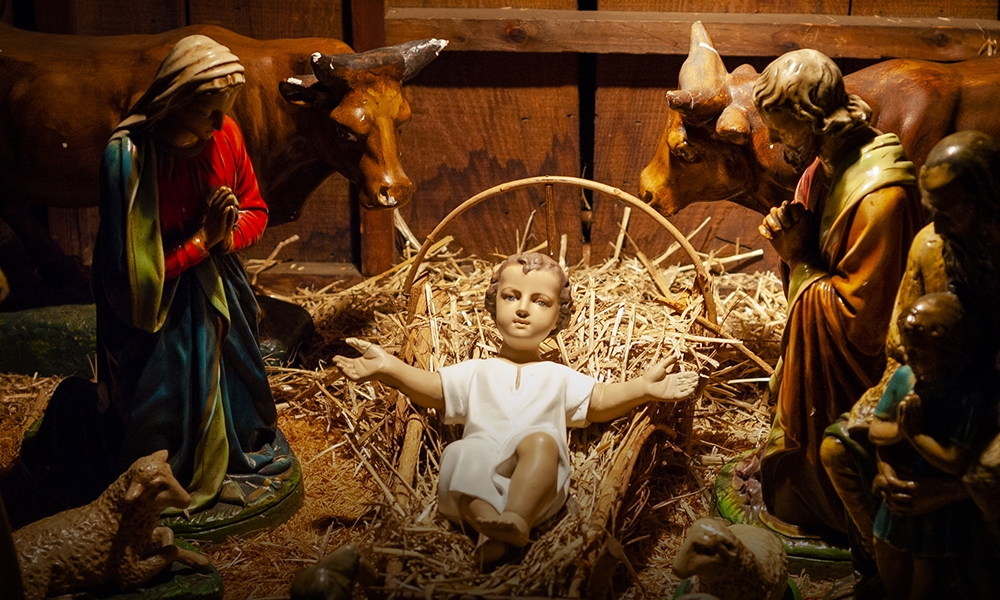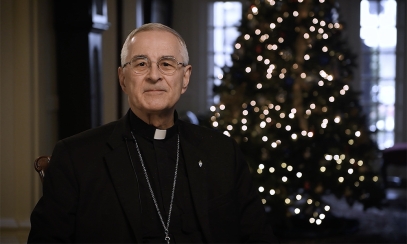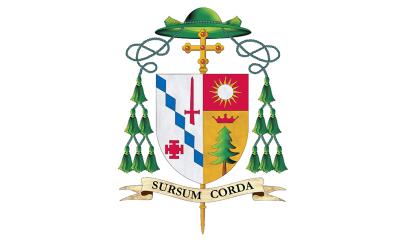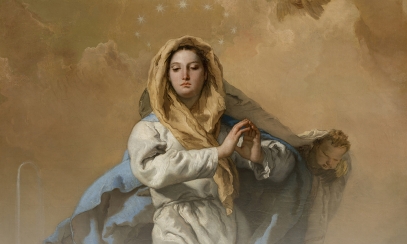
‘A ray of light, a glimmer of life to come, a sign of the life to come’
Bishop Raica celebrates Christmas at the Cathedral of St. Paul
Bishop Raica celebrates Christmas at the Cathedral of St. Paul
On Dec. 25, Bishop Raica marked the Solemnity of the Nativity of the Lord with Mass at the Cathedral of St. Paul. The complete text of his homily follows herein.
On Dec. 25, Bishop Raica marked the Solemnity of the Nativity of the Lord with Mass at the Cathedral of St. Paul. The complete text of his homily follows herein.
My brothers and sisters in Christ, on behalf of Father Jerabek and Father Adams, the staff of the Cathedral of St. Paul and the Diocese of Birmingham, I wish you and your family a very happy and blessed Christmas!
A very special warm welcome to our visitors and guests who’ve joined the Cathedral of St. Paul’s community for Christmas Mass as well as those following on livestream services. How welcome you all are!
There’s something unique about celebrating Christmas in its familiar and traditional ways that means so much for family and especially our faith family. Particularly, there’s something evocative today that stirs the heart just a little more. The beauty, the music, the flowers and decorations, and the Christmas Nativity Set all create a special experience that sets this celebration apart from all others as a reminder of the drama evoked by the Christmas event of God’s love. Very few, if any, will remember what exactly the priest said during his homily on Christmas, but they will remember being caught up in an event so stirring and powerful that it causes us to reflect more profoundly on the very mystery of God’s love in history and more so of God’s love for each one of us today.
Think of it, all we have been preparing for the past several weeks of Advent, now comes to fruition in the birth of a child in Bethlehem. The great prophet Isaiah, our Old Testament friend who accompanied us during our Advent celebrations and in our first reading today, reminds us quite pointedly, “The people who walked in darkness have seen a great light.” Ever since the fall of Adam and Eve that plunged the world into a type of darkness, the world waited for and looked for a someone – a Messiah, a savior, a redeemer, one who, through mercy and redemption of sin, would finally show us the way out of darkness of despair and into the light of hope and promise. The longed for “One” was talked about and hoped for, but they didn’t know when He would come or how He would make His appearance. They did know, however, that the future would be founded on this promise: “He will come … He will surely come and not delay!”
What would such an event be like? When the Messiah comes, would He come as a sort of commander-in-chief, a dictator who would finally set the world right, a famous preacher with soaring and attractive rhetoric who would draw people to Himself like no one else before Him, a miracle worker Who would dazzle the world with extraordinary displays and spectacles?
As we know now, there was no earthquake, tornado, electrical thunderstorm, or hurricane. No, He came in the silence of a night, not at the home of Mary and Joseph in Nazareth but in a stable in the back of an inn because there was no place for them as they went to their family homes to be counted in the census. It is as though He snuck into the world when He was least expected with few, if any, of the great and powerful even noticing it. In fact, it looks like He snuck right into the messiness of it all. The difficulties of having to migrate to Bethlehem because of a census of the world’s population near the end of Mary’s pregnancy is not something that brought comfort and joy. They didn’t find a room in the inn after the weariness and difficulties of travel, except for a hapless place in the back - a stable with all the corresponding discomforts, unpleasant smells and noises, and darkness that accompanies active barns at night. No doctors or hospitals were available to assist them at this critical moment as Mary was about to give birth. Yes, He slipped into our world before most even noticed.
Nevertheless, it didn’t go totally unnoticed. We are told by Luke’s Gospel, the angelic choirs sang their Glorias at His birth and the shepherds, who heard the glad tidings, found their way to the place where the baby Jesus lay. They were among the first to lay their eyes on “this thing” that happened in Bethlehem – to encounter Jesus, Mary, and Joseph on that special night.
There’s something in our minds and hearts that has heard this story and even now, some 2,000 years later, we, too, want to be part of this event. So, today we come bringing ourselves with all our pluses and minuses, our joys and sorrows, the blessings and challenges that we have, and we, too, go in haste to the manger to see this thing which has come to pass. As disciples, we want to live once again the wonder, simplicity, joy, and serenity that was discovered in the midst of so much chaos of the time. In a real sense, a light pierced the darkness and awakened the prospect of hope and joy once again.
What will this child be? How does this event touch us today?
We proclaim the angelic message: “Today is born for us a Savior, Christ the Lord!” The intervention of God is not always on our timetable. He comes in the most unlikely places and circumstances. Here, the word “today” is something that is not merely restricted to the event that occurred 2,000 years ago. That “today” means “now.” It is a “now” that is an ever present “today” in every place and every context – He brings a ray of hope and light to dispel the shadows and darkness that cloud our lives. The Holy Land today, Ukraine today, our cities today, our broken relationships, our struggles in life are the metaphoric dark stables where all we have is the hay and straw of our inadequacies, our hurts, and our sins, which may prevent us from welcoming this ineffable gift from God who has come “in the flesh!” At the same time, the wonder of this night finds us attracted to the birth of a child that still offers us hope amidst our despair, serenity amidst our anxiety, mercy amidst our sins and failings, and the promise of salvation.
So, for this reason we acknowledge that the birth of the Christ child is a new and radiant light for a world filled with shadows and darkness. He is the Messiah, the promised fulfillment of what was hoped for. The love divine that was diffused throughout the world seeks to be a key component of God’s plan of possibilities and potentials – an optimistic first step of the promise fulfilled. From this birth in Bethlehem, we see that what changes the world is not the love of power, but the power of love. It is echoed in the words of the angels to the shepherds and one that we echo today: “Do not be afraid; for behold, I proclaim to you good news of great joy that will be for all the people … a savior has been born for you who is Christ and Lord.” (cf. Lk 2:10)
In sharing that good news, a savior born “for you” and for me, we exchange Christmas greetings and cards; we prepare gifts for families and for the poor in our community. Those who came to the stable to see what has come to pass could only see through the simpleness of the event, the love that radiated in the relationships they saw. There was no other gift than to accept the One Who was given for us - the birth of a child, in austere conditions, but welcomed as the gift of God come in the flesh. Through this beautiful gesture, we look also to find among those in need, the unique presence of Christ, born for you, today. This will be the light to guide us on this journey as we seek to overcome the darkness of seemingly never-ending war, the violence that results in senseless tragedy, the lack of respect for human dignity we so often lament.
May the birth of the Christ child be for each of us a ray of light, a glimmer of life to come, and a sign of the life to come for which we proclaim as a faith community: “Joy to the world, the Lord is come!”



